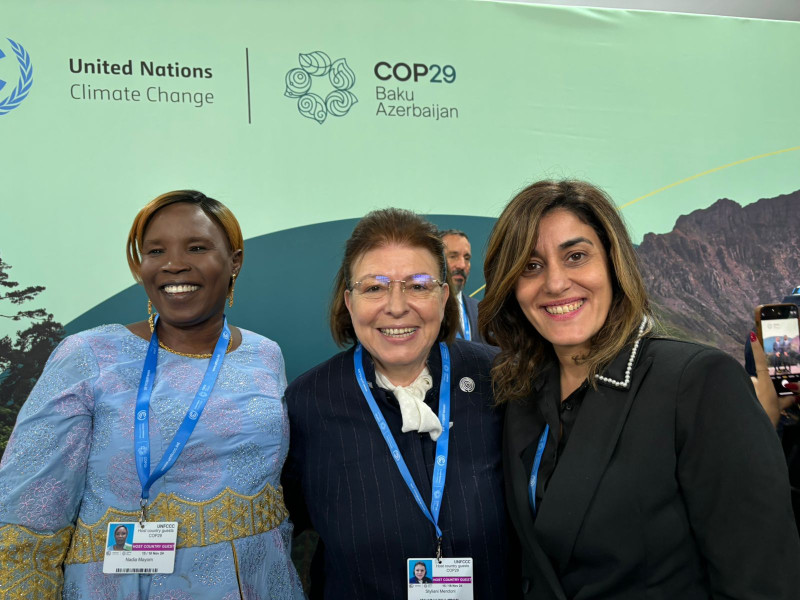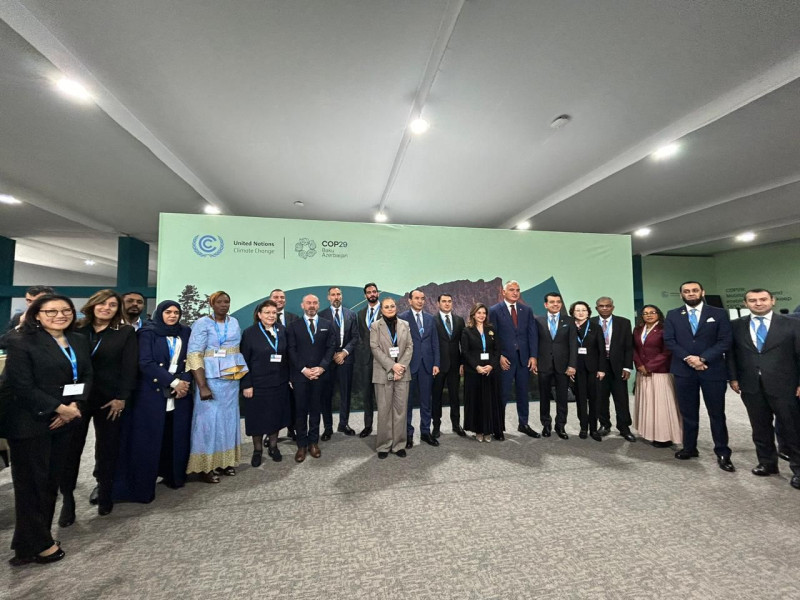Mendoni held talks with the Minister of Culture of the United Arab Emirates, the Minister of Culture and Tourism of Turkey, the Minister of National Heritage and Arts of Malta
The Minister of Culture Lina Mendonirepresented at COP29the Greek Government at the 2nd High Level Ministerial Dialogue on the Climate Crisis in Culture, which was held in Baku, the capital of Azerbaijan. In her intervention, Lina Mendoni noted that “given the rapid and intensifying effects of climate change, we must prioritize preventive action. We need to draw up climate vulnerability maps, for current and future threats, tailored to each heritage site. This is what Greece did, for example, in the recent submission of our candidacy to Unescofor the inclusion of the Minoan Palaces in the World Heritage List. The compilation of these maps must be aligned with a jointly agreed methodology to ensure scientific reliability and ensure comparability.”
OR Minister of Culture insisted on the need for international collaborations to share experiences and good practices, pointing out that in the last year a lot of work has been done in this direction by the joint groups of experts designated by each state, by those participating in the High Level Ministerial Dialogue, on Climate Crisis in Culture. He pointed out that in several countries the dimension of the climate threat to cultural heritage is either absent from the respective National Adaptation Plans, or is not connected to the respective Ministries of Culture. “In Greece, we have organized three international meetings for the protection of cultural heritage from climate threats, in the last three years, with participants from 12 countries in our wider region and the USA. Greece is ready to share its know-how and benefit from the experience of others”, Lina Mendoni pointed out and emphasized “the importance of the ecological orientation of the cultural sector to reduce the carbon footprint of the cultural tourism sectors, as well as culture and of creativity. Of course, these industries are largely made up of small businesses, which do not have much room for adaptability. Targeted approaches are therefore needed to promote new sustainable business models, incorporating innovative technologies and production methods. Greening should refer to cultural infrastructures, that is, museums, galleries, libraries and archives, and their gradual transformation into zero-balance facilities.’
Lina Mendoni had a working meeting with Princess of Jordan and Petra National Trust Chairman Dana Firas. At the heart of the discussion was the recognition of the significant role that culture has in the context of providing sustainable and effective proposals in the face of climate change and the importance of co-ordinating joint actions on the threat it entails for all forms of cultural heritage. The four axes of joint actions, with a focus on the Mediterranean countries, are based on the reduction of the effects of climate change on monuments and archaeological sites, the green transition for cultural infrastructures by reducing their carbon footprint, the promotion of environmentally friendly creative and cultural industries and the integration of knowledge systems for decision-making in the field of prevention.
The holding of a joint seminar by the Ministries of Culture of Greece and Jordan and the Petra National Trust is moving in this direction, with the aim of exchanging know-how, as well as cooperation, both in cultural educational programs for children and young people, as well as in the field of preserving traditional art forms and handicrafts. Dana Firas emphasized that “Greece is a leader in culture and initiatives to protect cultural heritage from climate change”.
The Minister of Culture of Greece had a working meeting with her counterpart Azerbaijan, Adil Karimliwhom he congratulated for organizing COP29. The Azeri Minister pointed out the important work that Greece has done to protect the cultural heritage from the devastating consequences of the climate crisis, in the context of the international initiative undertaken by the Greek Government, since 2019. At the core of bilateral cooperation and development cultural relations between the two countries are the protection, preservation and enhancement of cultural heritage including handicrafts and traditional practices, modern culture and creative and cultural industries.
On the sidelines of the Synod, the Minister of Culture had the opportunity to talk on bilateral issues with Mr Minister of Culture of the United Arab Emirates Salem bin Khalid Al Qassimi, the Minister of Culture and Tourism of Turkey Mehmet Nuri Ersoy, him Malta’s Minister of National Heritage and Arts Owen Bonnicias well as with her Aruna Francesca Maria Gujral, Director General of ICCROM (International Center for the Study of the Protection and Restoration of Cultural Heritage), of which Greece is an active member through the Ministry of Culture, and with Salim Mohammed A. Almalik, Director General of ICESCO (Islamic World Educational, Scientific and Cultural Organization).
After the end of the 2nd High Level Ministerial Dialogue on the Climate Crisis based on Culture, Lina Mendoni went, accompanied by Ambassador of Greece to Azerbaijan, Christos Kapodistrias, at the Greek Pavilion at COP29, where more than 45 events took place, with the participation of heads of state, ministers and government officials from dozens of countries, as well as academics, representatives of companies and civil society. At the Greek pavilion, the Ministry of Culture organized a special event on “Protecting Cultural Heritage from the Effects of Climate Change: Challenges and Good Practices”.
The event was attended by Princess Dana Firas of Jordan, UNESCO Goodwill Ambassador for Cultural Heritage, the Director of the World Monument Fund for Adaptation Meredith Wiggins, Kostantinos Kartalis Professor of EKUA and member of the European Union’s Scientific Committee on Climate Change and Sofia Spyropoulou , Archaeologist at the Ministry of Culture. The discussion highlighted the need for proactive action to protect archaeological sites and monuments from the effects of climate change, the use of scientific knowledge to assess the vulnerability and risks of cultural heritage, the lack of expertise in several countries, the limited integration of dimension of culture in the National Climate Change Adaptation Plans, as well as the limited participation of local communities in the preparation of the Adaptation Plans. In terms of good practices, the need to connect natural and cultural heritage, the use of new tools (climate models, digital applications), the integration of local and traditional practices in Adaptation Plans, but also the contribution of cultural and creative sectors in the green transition. Finally, the cooperation between the Ministry of Culture and the Ministry of Climate Crisis of Greece, for the preventive protection of 50 archaeological sites from forest fires, was presented as a good practice, as well as the structure and objectives of the digital platform of the Ministry of Culture for the assessment of climate risks for archaeological sites and monuments at territory level.
Source: Skai
I have worked in the news industry for over 10 years. I have been an author at News Bulletin 247 for the past 2 years. I mostly cover politics news. I am a highly experienced and respected journalist. I have won numerous awards for my work.












